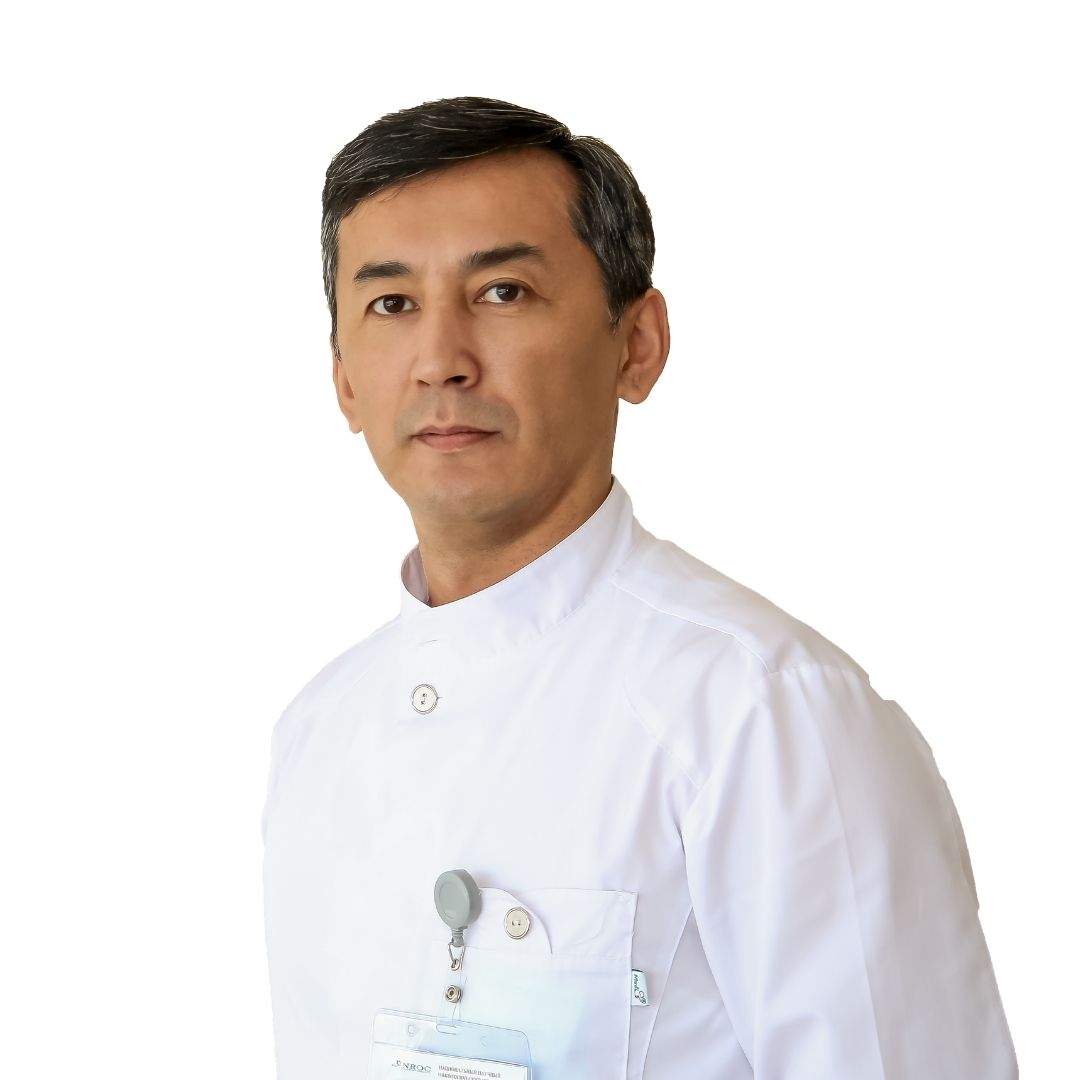
Head of the Center for expert endoscopy - Batyrbekov Kanat Umirzakovich, endoscopist of the highest qualification category, Candidate of Medical Sciences, President of the NGO "Kazakh Endoscopic Society".
He has repeatedly completed internships in South Korea and Japan, Germany, and completed correspondence postgraduate studies at Tyumen State Medical University.
He is a developer of endoscopy tests for qualification exams in gastroenterology and pulmonology, author of 30 scientific publications and methodological recommendations. The owner of the badges "Excellent Health Worker" in 2016, "Densaulyk Aktau isine koskan ulesi ushin" in 2021.
Functions and tasks:
- Provision of advisory, highly specialized and specialized medical care
- Introduction into practice of the latest minimally invasive X-ray surgical and endoscopic interventions in the treatment of various diseases based on international experience, standards and recommendations of evidence-based medicine
- Conducting research work, summarizing clinical and scientific data in order to develop new approaches in the provision of specialized and highly specialized medical care, their implementation in the practical medical activities of the Center
- Professional development of staff and organization of the department's work at the level of advanced foreign centers in the context of interventional radiology and endoscopy
Types of services:
- Diagnostic, therapeutic esophagogastroduodenoscopy
- Diagnostic and therapeutic colonoscopy
- Diagnostic and therapeutic bronchoscopy
- Endoscopic hemostasis
- Extraction of foreign bodies
- Endoscopic polypectomy
- Endoscopic mucosection
- Endoscopic dissection in the submucosal layer
- Endoscopic retrograde cholangiopancreatography
- Endoscopic papillosphincterotomy
- Mechanical extraction of choledoch stones
- Endoscopic balloon dilation of strictures of the colon and small intestine, esophagus and biliary tract
- Endoscopic stenting of the hollow organs of the gastrointestinal tract and TBD
- Transbronchial biopsy and puncture of thoracic lymph nodes of peripheral lung neoplasms
- Endoscopic ligation of VRVP, endoscopic sclerotherapy of gastric veins
- Perroral endoscopic myotomy
- Endoscopic diverticulectomy
- Endoscopic ablation of Barrett's esophagus
- Coronary angiography and stenting of coronary arteries
- Implantation of pacemakers
- Embolization of bronchial arteries
- Implantation of various venous catheters and subcutaneous ports
- Embolization of the splenic artery and varicose veins of the esophagus
- Chemoembolization of tumors of various localization
- Embolization of vessels with bleeding, aneurysms
- Percutaneous hepatic drainage and stenting of the bile ducts
- Uterine artery embolization
- Embolization of the prostate gland
- Balloon dilation and stenting of limb arteries
- Renal artery stenting
- Implantation of stent grafts into the thoracic and abdominal aorta
- Stenting of carotid and vertebral arteries
- Implantation of a cava filter
- Radiofrequency ablation of tumors of various localization
Senior Resident of the Interventional Radiology Sector of the Center for Expert Endoscopy and Interventional Radiology, interventional X-ray surgeon Chinaliev Azat Myrzabaevich.
About the sector:
Currently, interventional radiology methods are used to treat many diseases related to various areas of medicine, such as oncology, cardiology, hepatobiliary surgery, vascular surgery, gynecology, urology.
In our center, the work is mainly focused on high-tech surgical treatment and diagnosis of vascular pathology, chemoembolization, embolization of tumors of various localization.
X-ray surgical technologies are practically indispensable in the treatment of cancer patients, and are due to several reasons:
- this method of treatment allows you to perform most of the interventions under local anesthesia without anesthesia and with minimal trauma;
- it makes it possible to provide assistance to patients who are in a serious and extremely serious condition, patients with severe concomitant pathology who, for objective reasons, cannot be performed "large" surgical interventions;
- interventional radiological technologies can significantly save healthcare resources;
- significantly reduces the time of patients' stay in the clinic, without reducing the quality of their life;
- recovery time compared to traditional surgery is significantly reduced.
Types of services:
- coronary angiography and stenting of coronary arteries;
- implantation of pacemakers;
- implantation of various venous catheters and subcutaneous ports;
- embolization of the splenic artery and varicose veins of the esophagus;
- chemoembolization of tumors of various localization;
- embolization of vessels with bleeding, aneurysms;
- percutaneous hepatic drainage of the bile ducts;
- uterine artery embolization;
- embolization of the prostate gland;
- balloon dilation of limb arteries;
- implantation of stent grafts into the thoracic and abdominal aorta;
- implantation of a cava filter;
- Embolization of varicose veins of the pelvis;
- Stenting of arteries of various localization (iliac, coronary, subclavian, renal, carotid, vertebral, peripheral) and so on.
Contacts:
For interventional surgery: +7 (7172) 702-900 (ext.1273),
For endoscopy: 8(7172) 702 900 (ext.1028).




